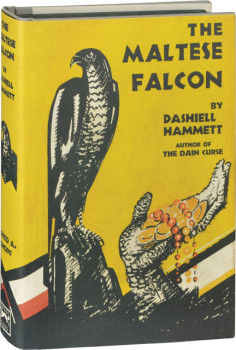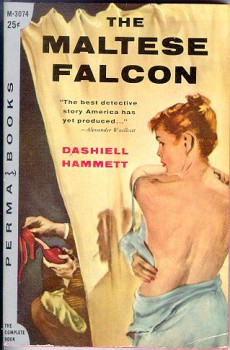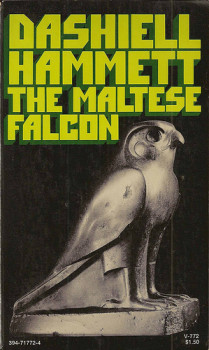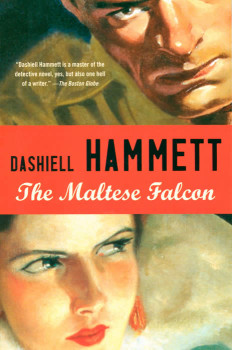Sam Spade and the Pursuit of Empty Dreams
NOTE: The following article was first published on February 21, 2010. Thank you to John O’Neill for agreeing to reprint these early articles, so they are archived at Black Gate which has been my home for over 5 years and 250 articles now. Thank you to Deuce Richardson without whom I never would have found my way. Minor editorial changes have been made in some cases to the original text.

 Much of what has been written about Dashiell Hammett’s The Maltese Falcon focuses on the novel as groundbreaking in its realistic portrayal of detective work. More in-depth literary studies tend to focus on the significance of Hammett’s shift in protagonist from the incorruptible and nameless Continental Op of his earlier work to the jaded self-portrait of the author as Sam Spade. In my view, this transition is primarily noteworthy in that Hammett’s protagonist changed from an idealized conception of the man he might have become had he remained a Pinkerton Operative (the Continental Op is based on Hammett’s boss during his stint with the Pinkerton Agency) to a more self-reflective portrayal of a man mired in moral conflict. Hammett’s own moral crisis would color his fiction from this point until he resolved his dilemma and settled into a life alternating his celebrity status with reclusiveness – a life whose one constant was Hammett’s complete lack of creative output for his remaining 27 years.
Much of what has been written about Dashiell Hammett’s The Maltese Falcon focuses on the novel as groundbreaking in its realistic portrayal of detective work. More in-depth literary studies tend to focus on the significance of Hammett’s shift in protagonist from the incorruptible and nameless Continental Op of his earlier work to the jaded self-portrait of the author as Sam Spade. In my view, this transition is primarily noteworthy in that Hammett’s protagonist changed from an idealized conception of the man he might have become had he remained a Pinkerton Operative (the Continental Op is based on Hammett’s boss during his stint with the Pinkerton Agency) to a more self-reflective portrayal of a man mired in moral conflict. Hammett’s own moral crisis would color his fiction from this point until he resolved his dilemma and settled into a life alternating his celebrity status with reclusiveness – a life whose one constant was Hammett’s complete lack of creative output for his remaining 27 years.
Many have speculated why Hammett’s creativity dried up when he and his muse and mistress Lillian Hellman had settled comfortably into something approaching unwedded bliss as the Nick and Nora Charles of the real world. My own opinion has been that once freed of the conflict of whether or not to walk a path of integrity or give in to the encroaching corruption that constantly assailed his world, Hammett had nothing further to draw upon for inspiration. Resolution was tantamount to becoming a spent force and Hammett was finished as a writer. The fact that he realized this dilemma was inescapable lies at the heart of both The Maltese Falcon and The Glass Key in their pursuit of empty dreams incapable of satisfying the characters whose lust is so great they are willing to die for or kill in their futile quests.
Hammett’s characters are marked as slaves of their appetites by their very names from Casper Gutman, the silver-tongued Fat Man of The Maltese Falcon to the murder victim who leant his moniker to The Thin Man. Hammett’s Fat Men and Thin Men are doomed by insatiable appetites for the empty objects of their desire. Whether starved or bloated, their hunger for that which will never grant them the sustenance they seek is unending and proves to be their undoing. The Maltese Falcon’s prized Black Bird with its mythological history is nothing but a worthless forgery beneath its shiny exterior. Those who have pursued the bird and have not forfeited their lives or liberty in its pursuit by the book’s conclusion do not learn from their folly, but simply continue to follow the next false trail.

 What of Sam Spade and his moral dilemma? Surely, the detective protagonist is above such base temptations? While Spade is embroiled with those who seek the Black Bird, his own conflict is dealing with the murder of his partner, Miles Archer and dealing with Archer’s wife, Iva. Spade has been sleeping with her behind Archer’s back and she expects Sam to make an honest woman of her now that her husband is no longer around to stand between them. What most literary critics miss in focusing on the gritty realism of Hammett’s story is that Iva Archer represents Spade’s own Black Bird, his empty object of desire that threatens to be his undoing. The novel begins and ends with Sam and Iva. It is a deliberate decision to open the book with a description of Spade as a blond Satan (Hammett is describing himself at the time of the book’s writing) and to close the book with Spade finally ready to face Iva and make the decision that will determine his fate for better or worse. That Hammett keeps Spade’s ultimate choice just outside the novel’s final paragraph is essential to a book built around characters tormented with moral dilemmas.
What of Sam Spade and his moral dilemma? Surely, the detective protagonist is above such base temptations? While Spade is embroiled with those who seek the Black Bird, his own conflict is dealing with the murder of his partner, Miles Archer and dealing with Archer’s wife, Iva. Spade has been sleeping with her behind Archer’s back and she expects Sam to make an honest woman of her now that her husband is no longer around to stand between them. What most literary critics miss in focusing on the gritty realism of Hammett’s story is that Iva Archer represents Spade’s own Black Bird, his empty object of desire that threatens to be his undoing. The novel begins and ends with Sam and Iva. It is a deliberate decision to open the book with a description of Spade as a blond Satan (Hammett is describing himself at the time of the book’s writing) and to close the book with Spade finally ready to face Iva and make the decision that will determine his fate for better or worse. That Hammett keeps Spade’s ultimate choice just outside the novel’s final paragraph is essential to a book built around characters tormented with moral dilemmas.
It is the function of the detective in mystery fiction to identify the root cause of the chaos that has set the story in motion and to restore order to an unjust world. The police in hardboiled fiction are stereotyped as corrupt or stupid (or frequently both), so the best hope for the few honest victims out there lies in the form of the private detective who eschews the organizational corruption of both City Hall and the Mob and chooses instead to live hand-to-mouth from one client to the next. This is how Hammett the union-buster for the Pinkerton Agency can be the same Hammett who did a prison term for refusing to testify against his fellow Communists during the McCarthy witch hunts. He was a man who did his best to always stay true to his own moral code in spite of his weaknesses.
Spade, like his creator, knows right from wrong every time unless it involves his libido. Miles Archer isn’t as smart or as trustworthy as Spade, but Spade still feels he has wronged his partner by sleeping with his wife and that makes him even more determined to see that Miles’ killer is brought to justice. When Archer’s murderer turns out to be Brigid O’Shaughnessy, the client Sam is likewise sleeping with, the central point that Sam’s libido is the source of the chaos in his world is brought home to him again and makes the book’s final scene where Sam faces Iva Archer all the more powerful as Spade has no choice but to accept that his own lust has made him a morally destructive force on par with Casper Gutman, the repugnant Fat Man he so despises.
As is the case with any true classic, this is but one aspect of what makes The Maltese Falcon a contender for the finest detective novel of all time and a book whose literary merit will make it the subject of discussion and a source of influence for decades to come. I remain a dedicated follower of both Raymond Chandler’s Philip Marlowe and Ross Macdonald’s Lew Archer novels, but much like Hammett’s own subsequent Sam Spade stories (“A Man Called Spade,” “Too Many Have Lived,” and “They Can Only Hang You Once”) or Joe Gores’ prequel, Spade & Archer or even John Huston’s classic 1941 film adaptation with Humphrey Bogart; none of them proved to be the Black Bird we were seeking.
William Patrick Maynard was licensed by the Sax Rohmer Literary Estate to continue the Fu Manchu thrillers beginning with The Terror of Fu Manchu (2009; Black Coat Press) and The Destiny of Fu Manchu (2012; Black Coat Press). The Triumph of Fu Manchu is coming soon from Black Coat Press.
I’m a failure when it comes to Hammett. I’ve only read a short story or two, and I can’t even recall what they were. Jason Robards, however, leaves an indelible impression as Dash in the movie JULIA.
I wonder what you thought of the Bogart film version of FALCON? I remember feeling that Mary Astor came from a whole different school of acting. As in, the not very good school…which somewhat marred the overall experience…
I have read a bunch of Chandler and love it.
I’ve seen other people make that complaint about Astor – myself, I’ve always thought she was just about perfect as the lying Miss O’Shaunesy. I read Red Harvest and The Dain Curse years ago and thought they were great, and got around to The Glass Key only a year or two ago, and I think it’s one of the finest mysteries I’ve ever read; it’s a true novel, which is actually pretty rare in this genre. I’ve tried to start the Maltese Falcon a half dozen times, and I can never get past the fact that Hammett starts the book with a description of Sam Spade that sounds nothing like Humphrey Bogart. I wonder if anyone else has ever had the same problem?
My wife would agree with you about Mary Astor, Mark. I have no issue with her. She seems like a bundle of insecurities and just unhinged enough to be dangerous. I love the Huston film, but not as much as the book.
Thomas, I agree on most everything you say except for FALCON. Probably because I picture Hammett whenever I start reading the book. That said, I find it impossible not to hear Bogart’s voice when reading the book. Listening to one of the full-length radio dramatizations does help, though.
‘when the murderer turns out to be Brigid O’Shaughnessey, the client Spade is likewise sleeping with’
Spade is in love with Brigid, but not sleeping with her. If he’d just been sleeping with her, he’d have sent her up the river, no sweat. Plenty more out there. The reason he’s screwed, blued, and tattooed at the end of the book is that he’s sent his True Love to prison, and now he’s stuck with facing obligations to a woman who doesn’t attract him nearly as much, and who probably won’t be any more faithful to Spade than she was to Miles.
That’s all from the book. The movie has no sex scenes, so it’s all in what you infer from what you think people were supposed to infer from hints about stuff outside the Hays Code. I like the book much better. Sorry Humphrey.
Bruce, read the book again. Sam sleeps with Brigid prior to searching her room. My article is not a discussion of the movie.
Bogart knows he looks nothing like Sam Spade but makes one concession to the book – he adopts a rictus-like grin which is described as one of Spade’s trademark expressions in the original story. I re-read this book after Bob posted an article about it. A couple of things struck me: (1) the whole relationship between Spade and the Femme Fatale is blackly hilarious; she lies and when she’s caught out, she weeps, bats her eyelashes and tells more lies and Spade plays along. Personally I thought Astor was completely miscast (I always reckoned she got the part because Huston owed somebody a favour). I would have much preferred somebody like Jane Wyman. (2) Spade is sticking to his code. If somebody kills your partner (or deliberately gets your partner killed) visiting some righteous retribution on their ass trumps everything else & (3) the description of Joel Cairo is pretty homophobic (although I guess it would have been pretty standard for the time).
Cool piece, Bill! I’ve had my own thoughts on why Hammett “quit.”
If anybody is interested in the Spade short stories, I wrote a bit about them last year. They’re nowhere as good as the Continental Op ones, sad to say.
https://www.blackgate.com/2014/05/05/the-public-life-of-sherlock-holmes-a-man-called-spade/
If you’ve never read the book or seen the Bogie film, you’ve got a major hole in your mystery education. Both are superb.
I’ve never heard that Huston felt obliged to use Astor. He turned right around and used her again – with Bogart – in Across the Pacific, an underrated movie that’s almost a parody of the wartime thriller. Astor was also brilliantly funny in Preston Sturges’ Palm Beach Story, almost stealing the movie from Claudette Colbert. (No mean feat.)
“the description of Joel Cairo is pretty homophobic (although I guess it would have been pretty standard for the time).”
Well, 1929, 1930 was not known for its open attitude toward homosexuality. That said, Spade is hardboiled. He’s tough on everyone. Is Hammett equally guilty of being insensitive to the obese? Does he slut-shame Brigid O’Shaugnessy? Sorry, but I see a world of a difference between something like Sapper at his worst and Hammett portraying characters who are immoral and driven by their appetites. I would rather applaud him for showing that people were promiscuous whether heterosexual, homosexual, or bisexual instead of pretending none of this existed. Part of the gritty realism that set his fiction apart was his characters acted like real people. They drank too much, ate too much, and screwed too much. I wouldn’t expect a man such as Spade to be anything other than a bully to Cairo or abusive to Wilmer.
>Bruce, read the book again. Spade sleeps with Brigid prior to searching her room.’
Just reread. You’re right. Apparently the scene of free love between a tarnished but honorable couple was not bestial or depraved enough to stick in my corrupted memory.
I never described any of the characters in the book as bestial or depraved. I merely said Sam’s libido was proving to be his undoing. However, it may be hyperbole serves your purpose best.
And let’s not forget that Spade was fooling around with Archer’s wife – and then promptly dumps her when she thinks the way is clear for them to do more. Spade’s really quite a bastard, which was, I think, Hammett’s point – a man who goes down the “mean streets” will become mean himself, at least to some degree. That’s a big difference from Chandler’s shining knight, Philip Marlowe.
Agreed. As much as Spade is great fun to read about, you wouldn’t want to be mixed up with such a character in real life because you’d likely come out worse for the wear. Brigid is a lying murderer. Neither are my idea of a tarnished but honorable couple nor is Brigid anyone’s True Love, least of all Sam’s.
William’s excellent article reminded me about something else connected to The Maltese Falcon. Published in September 2010 (after William’s article appeared) Otto Penzler edited the 1,100+ page reprint collected titled _The Black Lizard Big Book of Black Mask Stories_. Included in this amazing, stunning collection of Black Mask stories was the complete text of the serialized version of The Maltese Falcon. It was the first time it had ever been reprinted in its original form since its 5-part serialization in the Sept., 1929 through January 1930 issues.
As the intro to the novel points out, and which Penzler confirms in my interview with him, there were around 2,000 changes made from the magazine version to the final novel version. Penzler notes that something is gained and lost in both versions, but that on the whole they are about equal.
Here is the link to my lengthy review of the landmark collection:
http://www.tangentonline.com/the-pulp-magazines/246-the-pulp-magazines/1531-the-big-lizard-big-book-of-black-mast-stories-edited-by-otto-penzler
And here is the link to my interview with Penzler, where he speaks about more than just Black Mask and The Maltese Falcon:
http://www.tangentonline.com/interviews-columnsmenu-166/1487-interview-otto-penzler
And just to toss my two cents in on two items mentioned by others, I too couldn’t help but read the novel with Bogart’s voice. Impossible not to do if you’ve seen the movie. You will also note that very little of the movie dialog has been changed from Hammett’s in the novel. There was no need to change anything because Hammett nailed it.
While Bogart looks nothing like Hammett’s Sam Spade (who was tall and blonde), I could let that go because of Bogie’s performance. But I just did not care for Mary Astor as Spade’s love interest. Bad casting, imho. Just didn’t find her attractive, which is purely subjective, of course.
Fascinating stuff, Dave — thanks!
Wow, Dave! That’s quite a treasure trove there. Thank you for sharing it.
I enjoyed this perspective, even though it is currently 2024 and this was written some years ago. As a partner in Spade & Archer in the San Francisco Bay Area (www.SpadeAndArcher.com) I am always keen to learn perspectives on the name sake that drivers our real life detective agency.